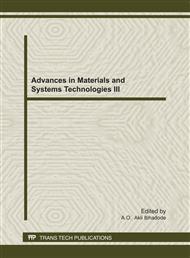[1]
S. French, Sequencing and Scheduling. Ellis Horwood Limited, (1982).
Google Scholar
[2]
A.E. Oluleye, E.O. Oyetunji, Performance of some static flowshop scheduling heuristics. Directions in Mathematics, (1999), 315-327.
Google Scholar
[3]
M.L. Pinedo, Scheduling: Theory, Algorithms, and Systems, Prentice-Hall, (2002).
Google Scholar
[4]
A. Nagar, J. Haddock J. and S. Heragu, Multiple and bicriteria scheduling: A literature survey. European Journal of Operational Research, 81 (1995), 88-104.
DOI: 10.1016/0377-2217(93)e0140-s
Google Scholar
[5]
C. Stein, J. Wein, On the Existence of Schedules that are Near-Optimal for both Makespan and Total Weighted Completion Time. Operations Research Letters, 21 (1997), 115-122.
DOI: 10.1016/s0167-6377(97)00025-4
Google Scholar
[6]
P. Uthaisombut, New Directions in Machine Scheduling, PhD Thesis, Michigan State University, USA, (2000).
Google Scholar
[7]
J.A. Hoogeveen, Multicriteria Scheduling. European Journal of Operational research, 167 (2005), 592-623.
DOI: 10.1016/j.ejor.2004.07.011
Google Scholar
[8]
B. Molnar, Multi-criteria scheduling of order picking processes with simulation optimization. Periodica Polytechnica SER. TRANSP. ENG., 33 (2005), 59–68.
Google Scholar
[9]
V. T'kindt, J. C. Billaut, Multicriteria Scheduling: Theory, Models and Algorithms. 2nd Edition. Springer, Berlin, (2006).
Google Scholar
[10]
D. Petrovic, D. Alejandra, P. Sania, Decision support tool for multi-objective job shop scheduling problems with linguistically quantified decision functions. Decision Support Systems, 43 (2007), 1527-1538.
DOI: 10.1016/j.dss.2006.06.006
Google Scholar
[11]
S. Chakrabarti, C.A. Phillips, A.S. Schulz, D.B. Shmoys, C. Stein, J. Wein, Improved scheduling algorithms for minsum criteria. In F. Meyer auf der Heide and B. Monien, editors, Automata, Languages and Programming, Lecture Notes in Computer Science 1099, 646-657, Berlin, 1996. Springer. Proceedings of the 23rd International Colloquium (ICALP'96), (1996).
DOI: 10.1007/3-540-61440-0_166
Google Scholar
[12]
J. Aslam, A. Rasala, C. Stein, N. Young, Improved Bicriteria Existence Theorems for Scheduling. In proceedings of the 10th annual ACM-SIAM Symposium on Discrete Algorithms, (1999), 846-847.
Google Scholar
[13]
A. Rasala, C. Stein, E. Torng, P. Uthaisombut, Existence Theorems, Lower Bounds and Algorithms for Scheduling to Meet Two Objectives, Technical Report, Dartmouth College, Computer Science Technical Report, PCS-TR99 – 347, (1999).
Google Scholar
[14]
J.A. Hoogeveen, S.L. van de Velde, Minimizing total completion time and maximum cost simultaneously is solvable in polynomial time. Operations Research Letters, 17 (1995), 205–208.
DOI: 10.1016/0167-6377(95)00023-d
Google Scholar
[15]
E.O. Oyetunji, A.E. Oluleye, Heuristics for Minimizing Total Completion Time and Number of Tardy Jobs Simultaneously on Single Machine with Release Time. Research Journal of Applied Sciences, 3 (2008), 147-152.
DOI: 10.7166/21-2-53
Google Scholar
[16]
E.O. Oyetunji, A.E. Oluleye, New Heuristics for Minimizing Total Completion Time and Number of Tardy Jobs Criteria on Single Machine with Release Time, South African Journal of Industrial Engineering, 21 (2010), 101-113.
DOI: 10.7166/21-2-53
Google Scholar
[17]
M. Ehrgott, X. Grandibleux, An Annotated Bibliography of Multiobjective Combinatorial Optimization, Report in Wirtschaftsmathematik, No. 62, Fachbereich Mathematik - Universitat Kaiserslautern, (2000).
Google Scholar
[18]
S.C. Aggarwal, B.A. MeCarl, The Development and Evaluation of a Cost-Based Composite Scheduling Rule. Naval Research Logistics, 21 (1974), 155-169.
DOI: 10.1002/nav.3800210111
Google Scholar
[19]
C. Chuen-Lung, R.L. Bulfin, Complexity of single machine, multi-criteria scheduling problems, European Journal of Operational Research, 70 (1993), 115-125.
DOI: 10.1016/0377-2217(93)90236-g
Google Scholar
[20]
F. Sivrikaya, U. Gunduz, A bicriteria two-machine permutation flowshop problem, European Journal of Operational Research, 107 (1998), 414-430.
DOI: 10.1016/s0377-2217(97)00338-x
Google Scholar
[21]
S. Sayin, S. Karabati, A Bicriteria Approach to the 2-machine flowshop Scheduling problem, European Journal of Operational Research, 113 (1999), 435–449.
DOI: 10.1016/s0377-2217(98)00009-5
Google Scholar
[22]
C. Chekuri, R. Motwani, B. Natarajan, C. Stein, Approximation techniques for Average Completion Time Scheduling. In Proceedings of the 8th ACM-SIAM Symposium on Discrete Algorithms, (1997), 609 – 618.
DOI: 10.1137/s0097539797327180
Google Scholar
[23]
E.O. Oyetunji, A.E. Oluleye, Hierarchical Minimization of Total Completion time and Number of Tardy Jobs Criteria. Asian Journal of Information Technology, 7 (2008), 157-161.
Google Scholar
[24]
E.O. Oyetunji, A.E. Oluleye, Evaluating Solution Methods to Bicriteria Scheduling Problems. Advanced Materials Research, 62-64 (2009), 577-584.
DOI: 10.4028/www.scientific.net/amr.62-64.577
Google Scholar
[25]
E.O. Oyetunji, Truncation and Composition of Schedules: A Good Strategy for Solving Bicriteria Scheduling Problems, American Journal of Scientific and Industrial Research 1 (2010), 427-434.
DOI: 10.5251/ajsir.2010.1.3.427.434
Google Scholar
[27]
E.O. Oyetunji, A.E. Oluleye, Heuristics for minimizing total completion time on single machine with release time. Advanced Materials Research, 18-19 (2007), 347-352.
DOI: 10.4028/www.scientific.net/amr.18-19.347
Google Scholar


